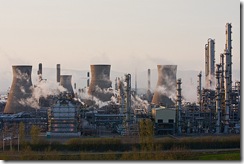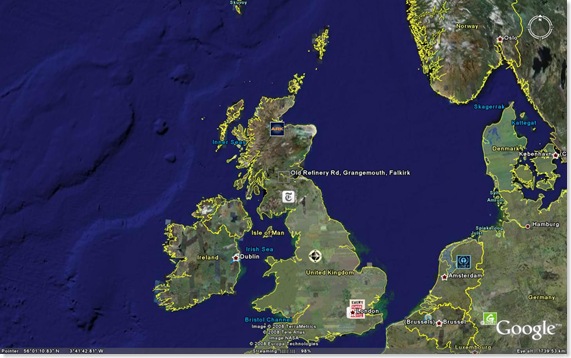Scotland's Oil-Are we going back to the 1970's ?
Some of you may know that I am Scottish and still live in Scotland which is why today's post is of particular interest and relevance to me. It is not often that Scotland gets a mention in terms of the Global Economy but today we have been all over the news.
The reason for this is that oil workers at the Grangemouth oil refinery in Scotland  are going on a two day strike starting on Sunday. The dispute is not about pay so much as pensions. The Wall Street Journal reports
are going on a two day strike starting on Sunday. The dispute is not about pay so much as pensions. The Wall Street Journal reports
It reminds me of when I was much younger and the last time that Labour was in power in the UK-we had the so called "Winter of Discontent" and the Miners and Dustbin Men Strikes.
“It was the decade of strikes, electricity shortages and piles of rotting rubbish on the street,” recalls a BBC report.
I was fairly young at the time but I can remember fairly frequent power cuts and problems getting coal for the fire we used to heat my parents Central heating System.It was also the time when arguably one of the UK's most militant Union Leaders Arthur Scargill head of the National Union of Mineworkers came to prominence.
Arthur Scargill head of the National Union of Mineworkers came to prominence.
Then in ‘73 the oil crisis broke. Arab OPEC members were outraged at the West’s support for Israel in the Yom Kippur war . They ceased shipments of oil to the US and Western Europe. At the same time all of OPEC decided to increase its prices following earlier failed negotiations with the “seven sisters” – the seven biggest Western oil companies at the time.
The result of this action was a damaging blow to the heart of the oil-dependent industrialised world. The price of crude went up fourfold (to $12!) and sent Britain’s already troubled economy into a tailspin. Growth stalled and inflation rose from 5% in 1970 to a high of almost 27% by August 1975. From a low of 5% in 1971, interest rates soon rose into double digits and hit 15% by 1976.
It is spookily similar to what we are seeing today history may not exactly repeat itself, but today oil’s and food prices have been shooting up and workers industrial action is once again making the news.
The question I guess is why is some relatively small refinery in Scotland making the news anyway? Well it is the receiving end of the major artery in the North Sea oil pipeline network. An artery that stretches from Grangemouth, south of Edinburgh, at one end to the Forties oil field over 200 miles away out in the North Sea at the other.
This pipeline transports crude from around 70 oil fields in the North Sea, amounting to over 40% of the UK’s entire crude production . It means BP -(BP-LSE) may have to close the pipe, with costing approx £50m per day ,the strike may only be for two days but it will take a week to boot up the refinery again afterwards.
So after more than three decades, with another Labour Government in power oil prices are high, food prices are going up and now, strikes are back. In the ‘70s the food/fuel double whammy led to stagflation . Deflation in the housing market forces consumers to tighten their belts and their resultant lower spending crimps growth.
So not only does it look like the UK is heading down the path of the US but the Global oil situation that I discussed in an earlier post this week- Has Oil Peaked ? is of severe enough dimensions that a 2 day strike in a refinery in the East Coast of Scotland merits Global headlines on the likes of Bloomberg- U.K. Braces for Fuel Cuts and CNBC Pipeline Strike
Break out the Candles-there may be trouble ahead !!
Best Wishes
Alan


|